
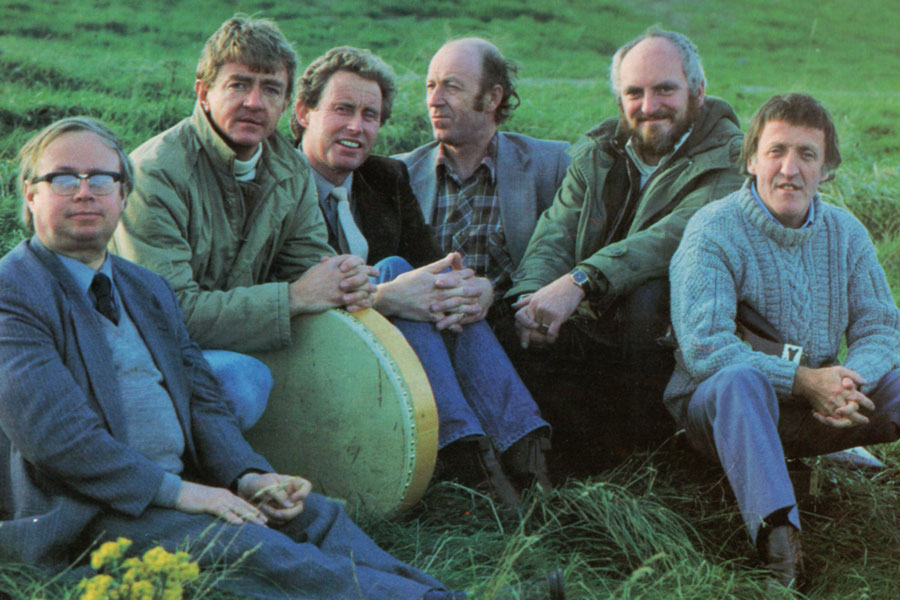
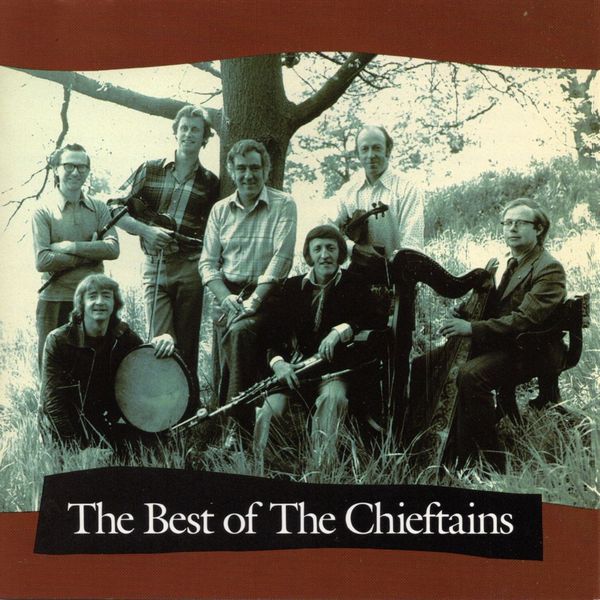 |
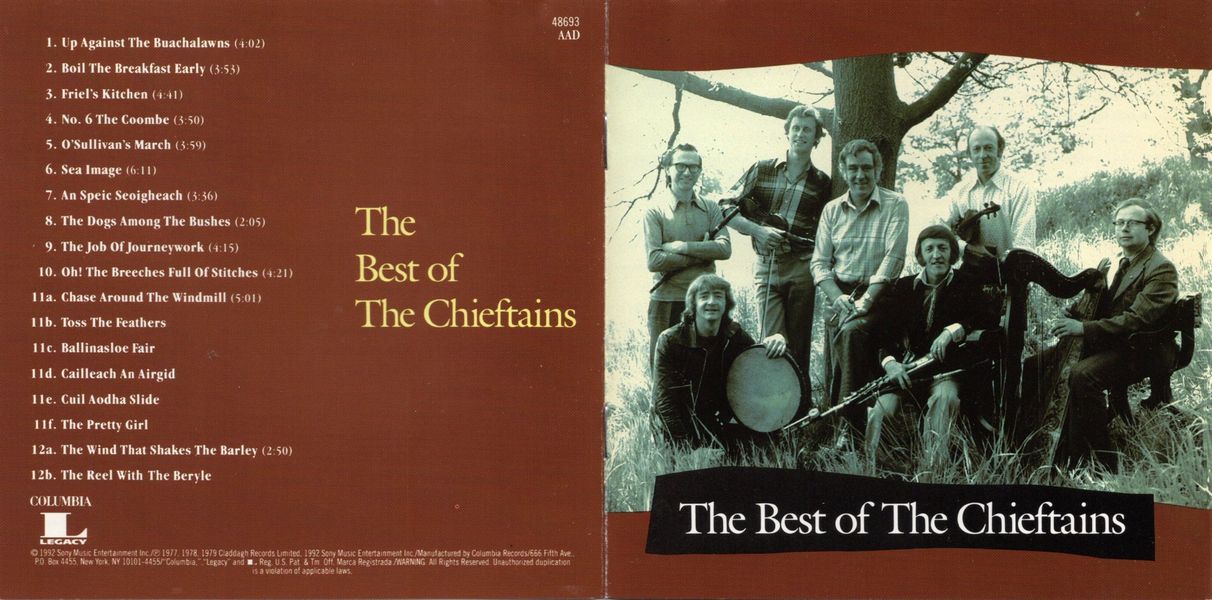
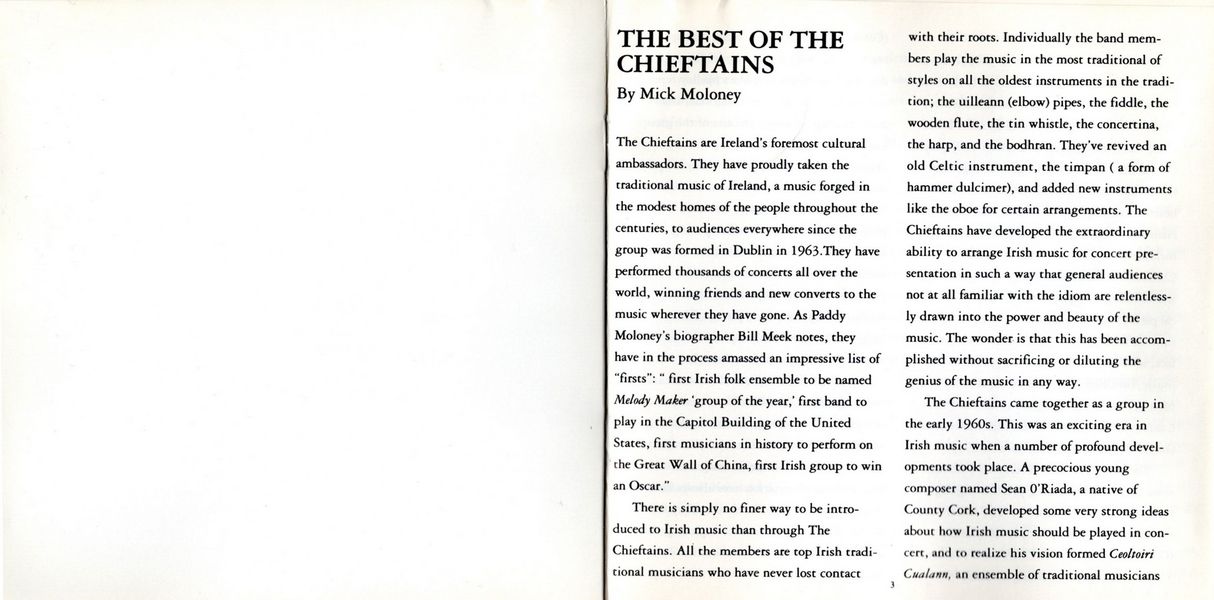
|
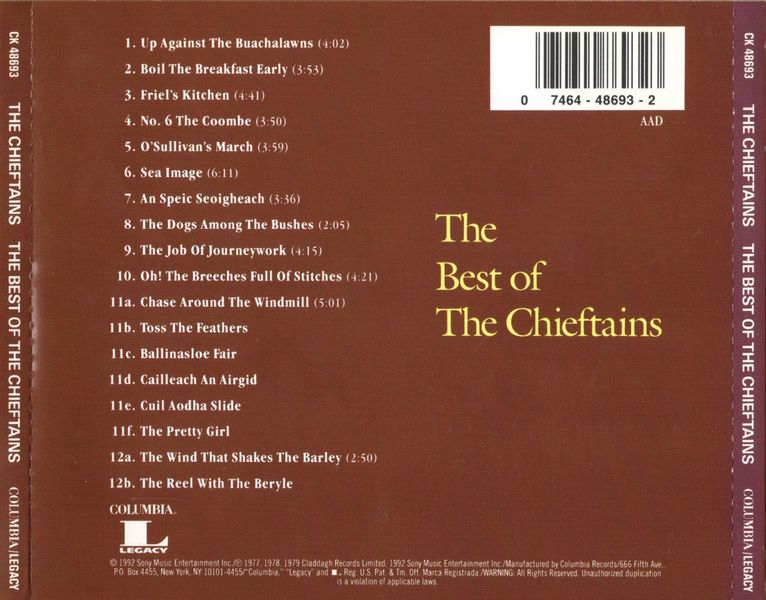
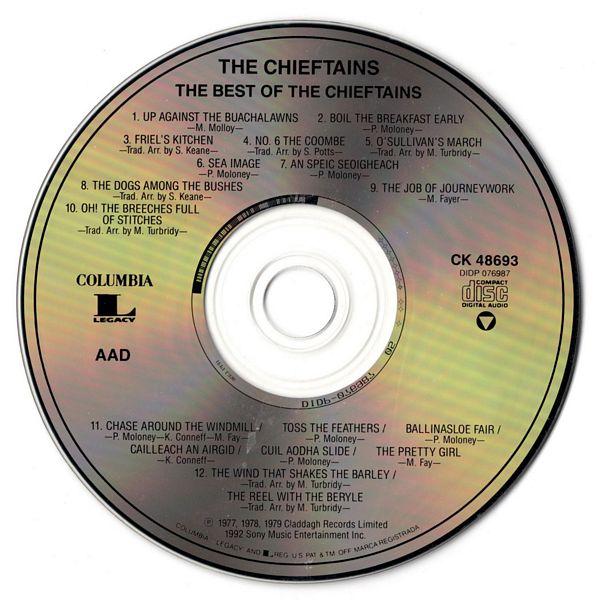 |
| more images |
Sleeve Notes
The Chieftains are Ireland's foremost cultural ambassadors. They have proudly taken the traditional music of Ireland, a music forged in the modest homes of the people throughout the centuries, to audiences everywhere since the group was formed in Dublin in 1963. They have performed thousands of concerts all over the world, winning friends and new converts to the music wherever they have gone. As Paddy Moloney's biographer Bill Meek notes, they have in the process amassed an impressive list of "firsts": " first Irish folk ensemble to be named Melody Maker 'group of the year,' first band to play in the Capitol Building of the United States, first musicians in history to perform on the Great Wall of China, first Irish group to win an Oscar."
There is simply no finer way to be introduced to Irish music than through The Chieftains. All the members are top Irish traditional musicians who have never lost contact with their roots. Individually the band members play the music in the most traditional of styles on all the oldest instruments in the tradition; the uilleann (elbow) pipes, the fiddle, the wooden flute, the tin whistle, the concertina, the harp, and the bodhran. They've revived an old Celtic instrument, the timpan (a form of hammer dulcimer), and added new instruments like the oboe for certain arrangements. The Chieftains have developed the extraordinary ability to arrange Irish music for concert presentation in such a way that general audiences not at all familiar with the idiom are relentlessly drawn into the power and beauty of the music. The wonder is that this has been accomplished without sacrificing or diluting the genius of the music in any way.
The Chieftains came together as a group in the early 1960s. This was an exciting era in Irish music when a number of profound developments took place. A precocious young composer named Sean O'Riada, a native of County Cork, developed some very strong ideas about how Irish music should be played in concert, and to realize his vision formed Ceoltoiri Cualann, an ensemble of traditional musicians based in Dublin.
The sound that the ensemble produced was quite unlike anything ever heard in Irish music. The effect it had on widely diverse audiences, whether in live performance or on radio broadcasts, was nothing short of electric. They played the old dance music with a gay, lilting, infectious abandon and the old Gaelic airs with heart-wrenching pathos. Up to that time musicians in Irish ceili bands would simply play melodies in unison in strict rhythm. The Chieftains broke from this rigid pattern. They would change tempos in the middle of a musical piece, switching say from a reel to a jig to a slow air back again to a reel then to a polka; in fact, with this novel creative approach to the music, breaking rules became the norm. Paddy Moloney was a central figure in Ceoltoiri Cualann and it was his vision that was to lead to the formation of The Chieftains in 1963.
The Chieftains have recorded 24 albums since then. This recording presents highlights from three albums made by The Chieftains in 1977, 1978 and 1979: The Chieftains 7 (Columbia 35612 ), The Chieftains 8 (Columbia 35726 ) and Boil The Breakfast Early (Columbia 36401) respectively. The opening track begins with a stunning fiddle and flute duet by Seán Keane and Matt Molloy representing the finest of old style traditional Irish musicianship, and then the rest of the group joins in to create the flair and pulsating drive characteristic of the kind of Irish music played in the kinds of informal sessions that are the heart and soul of the music wherever it is played. From that memorable opening we are taken through the usual Chieftains musical menu of traditional dance tunes, slow airs, compositions from the harpers and beautiful evocative impressionistic pieces such as "Sea Image" which are lushly layered thematic elaborations on traditional music motifs.
By subtle combinations of instruments and time signatures, The Chieftains create a delightful, compelling, constantly shifting mosaic of textural, harmonic, rhythmic, and melodic variation in their arrangements. Innovation and variation have always been the stock in trade of The Chieftains. They are known for their penchant for exploring the possibilities of traditional tunes in thoroughly unique fashion.
In addition to their concerts and sound recordings, The Chieftains have made countless television appearances, performed for ballet and theater, and played on the sound tracks for several films including Tristan and Isolde, Barry Lyndon, The Grey Fox, The Purple Taxi and The Ballad of The Irish Horse.
The Chieftains continue to explore, reach out to, and be inspired by new musical forms and musicians from other idioms and cultures. Concerts and recordings now feature a changing cast of international guest artists who enliven The Chieftains' shows and continue to entertain and challenge their diverse audience. Indeed the list of their musical collaborators over the past three decades lists like a veritable Who's Who in the world of contemporary Western music.
They have performed with chamber, concert and symphony orchestras and recorded with Jackson Browne, Marianne Faithful, Van Morrison, Eric Clapton, Mike Oldfield, Art Garfunkel, Kate and Anna Magarrigle, James Galway, and scores of other outstanding musicians.
The Chieftains have had a profound effect upon Irish music. They were one of the primary catalysts in its movement from the homes of the people onto the concert stage. Experimentation with musical textures, harmonies, styles and rhythms has now become an integral part of the tradition of group arrangements for public performances of music and songs. Instruments such as the bodhran, bones and tin whistle that Ceoltoiri Cualann and The Chieftains had reintroduced to the music have now become a familiar feature of Irish instrumental music.
The old music of the harpers of the 17th and 18th century, particularly the music of Turlough O'Carolan, has also been re-introduced to the nation by The Chieftains, and a widespread interest in the harp has developed in Ireland and America, with hundreds of new enthusiasts taking up the instrument in the past decade.
Most important of all, the traditional music which is such an integral part of Irish culture now enjoys a prestigious status after years of being disparaged as "bogman's music" by the literati whose canons of taste were based on the conventions of Western European high art.
That way of thinking has a way of catching on, and many traditional Irish musicians tended to view their own music with a feeling of extreme inferiority. This attitude is no longer fashionable, and for their contribution to that change The Chieftains deserve the gratitude of the Irish nation and indeed the world.
The Chieftains
Paddy Moloney: uilleann pipes, tin whistle. Paddy, like several other members of The Chieftains is a native of Dublin. He began Irish music on the tin whistle when he was eight years old and shortly afterwards began studying uilleann piping with master piper Leo Rowsome. He played in a number of musical groups in the Dublin area before meeting up with Sean O'Riada in the late 1950s and collaborating with him in the enormously influential Ceoltoiri Cualann. He has, from the early days of the group, been the main creative force behind The Chieftains' musical arrangements.
Seán Keane: fiddle. Sean was born in Dublin into an extremely musical household. Both his father and mother were traditional fiddlers and Sean himself began playing at the age of six. He rapidly blossomed into one of the most brilliant young musicians in Ireland, winning scores of awards in the process, including first place in the All Ireland championship and the prestigious Fiddler of Dooney competition. He has truly earned the title of "master fiddler."
Mick Tubridy: flute, tin whistle, concertina. Mick was born in the town of Kilrush in West Clare, a part of Ireland steeped in traditional music. He became proficient in both concertina and flute before moving to Dublin where he met with Paddy Moloney. Mick played the concertina occasionally in some of The Chieftains arrangements but for the most part concentrated on the flute which he plays in a compelling, understated, deeply traditional style.
Kevin Cunniffe: bodhran (goatskin drum ), vocals, lilting. Kevin comes from the Liberties area of Dublin. He was a well known virtuoso singer in Irish and English on the Dublin folk scene in the 1960s and early 70s and a bodhran player who brought enormous skill and subtlety to his accompaniment of traditional musicians. Kevin joined The Chieftains in 1975 replacing Peadar Mercier, who played bodhran on the earlier group recordings.
Matt Molloy: flute. Matt, a native of county Roscommon, is widely recognized as the best flute player in Irish traditional music, an impressive accolade given the great number of outstanding Irish flute players in the contemporary scene. He won the All Ireland flute title several times in his teens. He played with a number of groups including the Bothy Band and Planxty before joining The Chieftains in 1977, replacing Michael Tubridy.
Martin Fay: fiddle. Martin, a native of Dublin, was one of the original Chieftains and also a member of Ceoltoiri Cualann. His early training was in classical violin. It led him to a part-time position in the orchestra of the Abbey Theater where he met with Sean O'Riada who invited him to join Ceoltoiri Cualann. Martin's particular preferences are the beautiful old slow airs which The Chieftains have arranged with unparalleled artistry.
Derek Bell: harp, timpan, oboe. Derek, the virtuoso harper with The Chieftains, is a native of Belfast, where he still makes his home. He began learning music at an early age and later studied in London and Colorado. His early interests were in classical music, and by the time he joined The Chieftains as a full-time member in the early 1970s, he had appeared with the Royal Philharmonic Orchestra and the Pittsburgh, Moscow, London and Budapest Symphony Orchestras and had recorded five solo albums, four on harp and one on piano.
Sean Potts: tin whistle. Sean was born in Dublin, the son of the famed fiddler Tommy Potts, one of the most creative and inventive figures in Irish traditional music in this century. Sean was always one of the most animated personalities in The Chieftains and added a great flair and life to the group's live appearances. In addition to his recordings with The Chieftains, Sean recorded a memorable duo tin whistle album with Paddy Moloney in 1975 — the first of its kind in Irish music.
Mick Moloney
Philadelphia, November 1991.